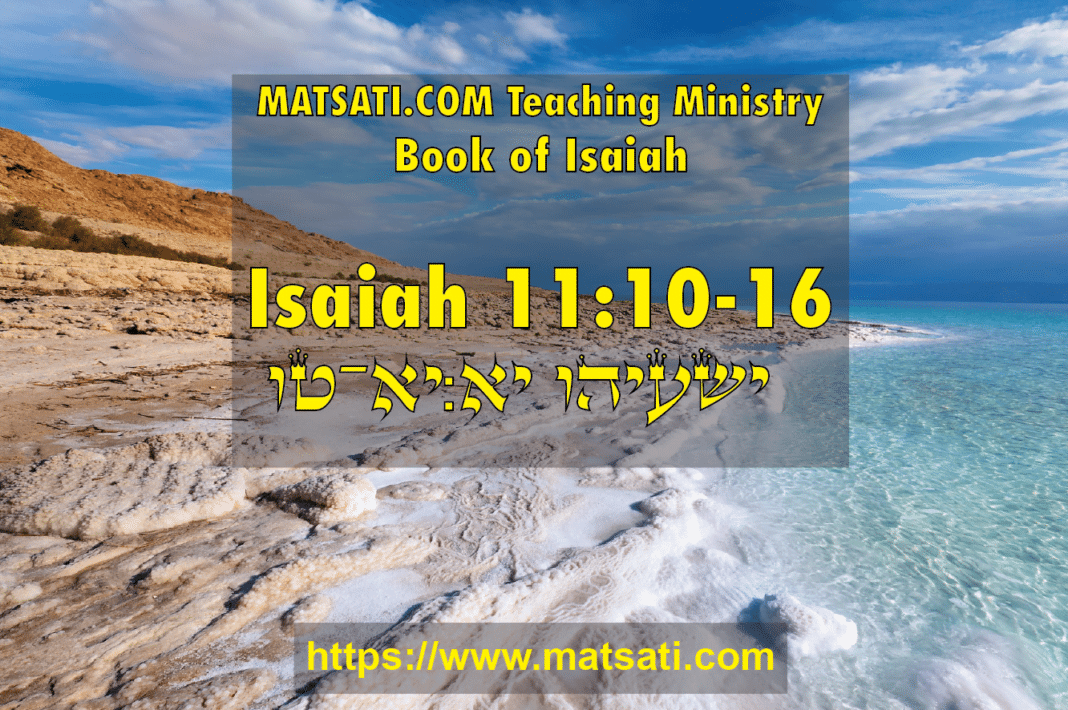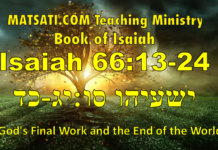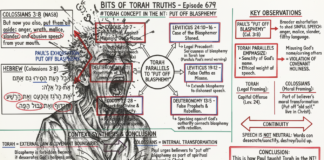Table of Contents
Introduction to Isaiah 11:10-16
We note that the coming of the Messiah would result in a great restoration of God’s people. The Targum describes the believers gathering around the Messiah, and Paul argues that “they” refers to “everyone” having the opportunity to gather even from the farthest reaches of the earth. We note that Assyria is about to destroy Judah and Isaiah is providing the people with hope, if they would repent, and turn from their sins, and trust in the Lord God Almighty, He would bring a redeemer to save them from their situation.
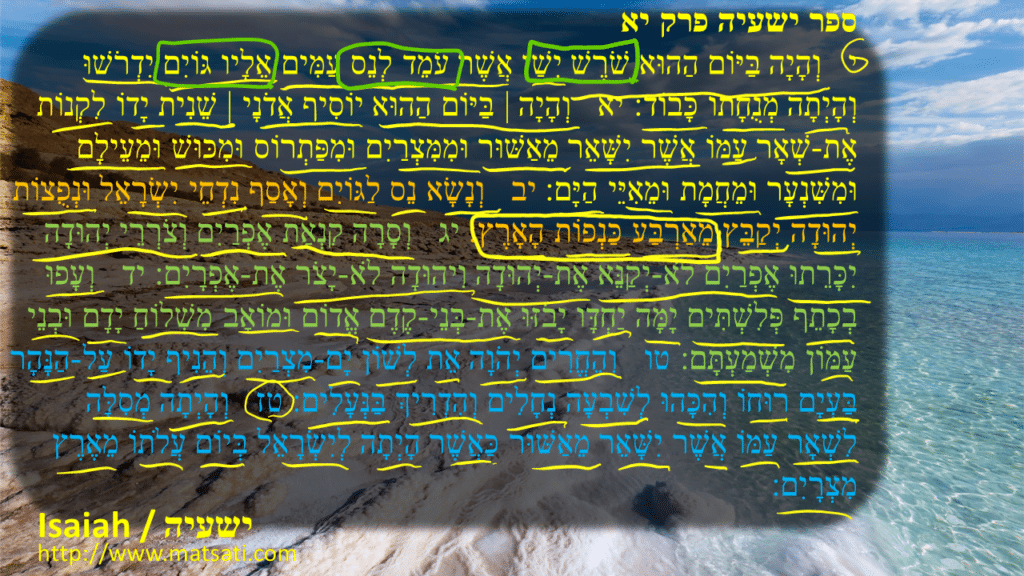
ספר ישעיה פרק יא
י וְהָיָה בַּיּוֹם הַהוּא שֹׁרֶשׁ יִשַׁי אֲשֶׁר עֹמֵד לְנֵס עַמִּים אֵלָיו גּוֹיִם יִדְרֹשׁוּ וְהָיְתָה מְנֻחָתוֹ כָּבוֹד: יא וְהָיָה | בַּיּוֹם הַהוּא יוֹסִיף אֲדֹנָי | שֵׁנִית יָדוֹ לִקְנוֹת אֶת-שְׁאָר עַמּוֹ אֲשֶׁר יִשָּׁאֵר מֵאַשּׁוּר וּמִמִּצְרַיִם וּמִפַּתְרוֹס וּמִכּוּשׁ וּמֵעֵילָם וּמִשִּׁנְעָר וּמֵחֲמָת וּמֵאִיֵּי הַיָּם:
Isaiah 11:10 states, “And in that day there shall be a root of Jesse, (וְהָיָה בַּיּוֹם הַהוּא שֹׁרֶשׁ יִשַׁי) which shall stand for an ensign of the people; (אֲשֶׁר עֹמֵד לְנֵס עַמִּים) to it shall the Gentiles seek: and his rest shall be glorious. (אֵלָיו גּוֹיִם יִדְרֹשׁוּ וְהָיְתָה מְנֻחָתוֹ כָּבוֹד)” Isaiah 11:11 “And it shall come to pass in that day, (וְהָיָה | בַּיּוֹם הַהוּא) that the Lord shall set his hand again the second time to recover the remnant of his people, (יוֹסִיף אֲדֹנָי | שֵׁנִית יָדוֹ לִקְנוֹת אֶת-שְׁאָר עַמּוֹ) which shall be left, from Assyria, and from Egypt, and from Pathros, and from Cush, and from Elam, and from Shinar, and from Hamath, and from the islands of the sea. (אֲשֶׁר יִשָּׁאֵר מֵאַשּׁוּר וּמִמִּצְרַיִם וּמִפַּתְרוֹס וּמִכּוּשׁ וּמֵעֵילָם וּמִשִּׁנְעָר וּמֵחֲמָת וּמֵאִיֵּי הַיָּם)” This root of Jesse (שֹׁרֶשׁ יִשַׁי) has been connected to the Messianic King according to Isaiah and the rabbinic literature. Isaiah makes an interesting claim, that this שֹׁרֶשׁ יִשַׁי would עֹמֵד לְנֵס “stand for a sign” to the peoples (עַמִּים). Isaiah goes on to say אֵלָיו גּוֹיִם יִדְרֹשׁוּ “unto him the gentiles they will seek” indicating that the King Messiah will make peace. We note a similar parallel in the last days of David and of Solomon. Here we are told that God caused the nations to be at peace with Israel. In addition, the rest of the Messianic King Isaiah says will be glorious (וְהָיְתָה מְנֻחָתוֹ כָּבוֹד). We note what Yeshua said, “Come to me, all who labor and are heavy laden, and I will give you rest.” (Matthew 11:28) Here the Apostle Paul used Isaiah 11:10 in Romans 15:12 in his discussion joining the salvation of Israel and the hope of the gentiles to the Messiah.
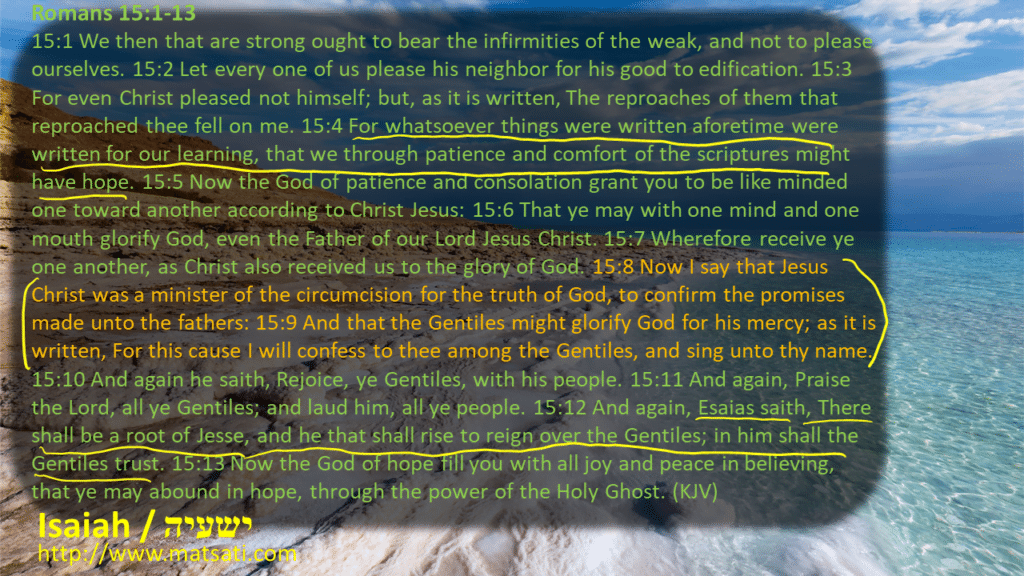
Romans 15:1-13
15:1 We then that are strong ought to bear the infirmities of the weak, and not to please ourselves. 15:2 Let every one of us please his neighbor for his good to edification. 15:3 For even Christ pleased not himself; but, as it is written, The reproaches of them that reproached thee fell on me. 15:4 For whatsoever things were written aforetime were written for our learning, that we through patience and comfort of the scriptures might have hope. 15:5 Now the God of patience and consolation grant you to be like minded one toward another according to Christ Jesus: 15:6 That ye may with one mind and one mouth glorify God, even the Father of our Lord Jesus Christ. 15:7 Wherefore receive ye one another, as Christ also received us to the glory of God. 15:8 Now I say that Jesus Christ was a minister of the circumcision for the truth of God, to confirm the promises made unto the fathers: 15:9 And that the Gentiles might glorify God for his mercy; as it is written, For this cause I will confess to thee among the Gentiles, and sing unto thy name. 15:10 And again he saith, Rejoice, ye Gentiles, with his people. 15:11 And again, Praise the Lord, all ye Gentiles; and laud him, all ye people. 15:12 And again, Esaias saith, There shall be a root of Jesse, and he that shall rise to reign over the Gentiles; in him shall the Gentiles trust. 15:13 Now the God of hope fill you with all joy and peace in believing, that ye may abound in hope, through the power of the Holy Ghost. (KJV)
Paul opens chapter 15 speaking of the strong bearing the afflictions of the weak and doing so as a servant where Yeshua provided us the example. Paul is speaking about being good neighbors to one another, like minded, receiving, patience, and to be mindful that Yeshua demonstrated this for us. Romans 15:8-9 speak to Yeshua’s ministry, and the position of the gentiles as praising God for His great mercy. Paul uses Isaiah 11:10 in Romans 15:12 speaking of the root of Jesse (referring to Yeshua the Messiah) and this great mercy and grace of God being the hope of all peoples! Paul writes that the Messiah will be a sign (לְנֵס) in whom the faithful will gather because of the mercy of God. This is very reminiscent of how the TgJ put this according to Isaiah ה וִיהֹון צַדִיקַיָא סְחֹור סְחֹור לֵיה וְעָבְדֵי הֵימָנוּתָא מְקָרְבִין לֵיה׃ 11:5 And the righteous shall be round about Him, and those that work in faith shall draw nigh unto Him. (TgJ) Our faith should draw us to the Messiah, if we are remaining in the Word of God (the Bible). Without the Messiah restoration and redemption would not be possible. Isaiah emphasizes the Lord God Almighty fulfilling His promises to Abraham through raising a root out of Jesse designed to show mercy to both jew and gentile.
Isaiah 11:11 speaks of the Lord seeking the return of the people to the Land of Israel. We note that these things speak to both God’s trustworthiness and His keeping the covenant promises with his people. We note that Isaiah 11:10-11 speak to Isaiah 2:2 which states, “And it shall come to pass (וְהָיָ֣ה׀) in the last days, (בְּאַחֲרִ֣ית הַיָּמִ֗ים) That the mountain of the Lord’s house shall be established (נָכ֨וֹן יִֽהְיֶ֜ה הַ֤ר בֵּית־יְהוָה֙) in the top of the mountains, (בְּרֹ֣אשׁ הֶהָרִ֔ים) And shall be exalted above the hills; (וְנִשָּׂ֖א מִגְּבָע֑וֹת) And all nations shall flow unto it. (וְנָהֲר֥וּ אֵלָ֖יו כָּל־הַגּוֹיִֽם)” Note how Isaiah here speaks of the future restoration of Israel and of the nation’s being drawn to truth and life in the Messiah! These truths come forth when we look at the full revelation of Isaiah concerning Yeshua the Messiah. Note how Yeshua draws this concept in saying according to John 12:32, “And I, if I be lifted up from the earth, will draw all men unto me.” This again draws us back to the sign (לְנֵס) the Messianic King will function as to draw men to Him. Note these things also draw in the Torah perspective from Parashat Chukat in Bamidbar / Numbers 21 and the fiery serpents which bit the people, how the bronze serpent was raised up as a sign (נס) to the people to look at and by faith be healed. The rabbis say that this seref nakhash (Fiery serpent) the healing God provided was both physical and spiritual. There are obvious parallels to Yeshua the Messiah based upon the NT descriptions. The nations come streaming to the God by faith in the one who is lifted up (the King Messiah), to the God who by his mercy and grace has opened for us a way to come into his presence. Isaiah continues saying the following:
ספר ישעיה פרק יא
יב וְנָשָֹא נֵס לַגּוֹיִם וְאָסַף נִדְחֵי יִשְֹרָאֵל וּנְפֻצוֹת יְהוּדָה יְקַבֵּץ מֵאַרְבַּע כַּנְפוֹת הָאָרֶץ:
Isaiah 11:12 states, “And he shall set up an ensign for the nations, (וְנָשָֹא נֵס לַגּוֹיִם) and shall assemble the outcasts of Israel, and gather together the dispersed of Judah (וְאָסַף נִדְחֵי יִשְֹרָאֵל וּנְפֻצוֹת יְהוּדָה יְקַבֵּץ) from the four corners of the earth. (מֵאַרְבַּע כַּנְפוֹת הָאָרֶץ)” This verse speaks of the Lord God drawing His people back to Israel, from wherever they have been dispersed. A side note, מֵאַרְבַּע כַּנְפוֹת הָאָרֶץ “from the four corners of the earth” is not a reference to the earth being flat or square. This is simply a reference to north, east, south, and west. It’s a simple geometric abstraction for how a sphere can fit inside of a cube to provide direction corresponding to the direction of the compass. We note here וְאָסַף נִדְחֵי יִשְֹרָאֵל וּנְפֻצוֹת יְהוּדָה יְקַבֵּץ “and shall assemble the outcasts of Israel and gather together the dispersed of Judah” the Lord is saying there is a remnant from both Israel and Judah. This also interestingly does not support the idea of the ten lost tribes of Israel and how Judah becomes the new Israel. The remnant restoration being spoken of here includes both Israel and Judah.
ספר ישעיה פרק יא
יג וְסָרָה קִנְאַת אֶפְרַיִם וְצֹרְרֵי יְהוּדָה יִכָּרֵתוּ אֶפְרַיִם לֹא-יְקַנֵּא אֶת-יְהוּדָה וִיהוּדָה לֹא-יָצֹר אֶת-אֶפְרָיִם: יד וְעָפוּ בְכָתֵף פְּלִשְׁתִּים יָמָּה יַחְדָּו יָבֹזּוּ אֶת-בְּנֵי-קֶדֶם אֱדוֹם וּמוֹאָב מִשְׁלוֹחַ יָדָם וּבְנֵי עַמּוֹן מִשְׁמַעְתָּם:
Isaiah 11:13 states, “The envy also of Ephraim shall depart, (וְסָרָה קִנְאַת אֶפְרַיִם) and the adversaries of Judah shall be cut off: (וְצֹרְרֵי יְהוּדָה יִכָּרֵתוּ) Ephraim shall not envy Judah, and Judah shall not vex Ephraim. (אֶפְרַיִם לֹא-יְקַנֵּא אֶת-יְהוּדָה וִיהוּדָה לֹא-יָצֹר אֶת-אֶפְרָיִם)” Isaiah 11:14 “But they shall fly upon the shoulders of the Philistines toward the west; (וְעָפוּ בְכָתֵף פְּלִשְׁתִּים יָמָּה) they shall spoil them of the east together: (יַחְדָּו יָבֹזּוּ אֶת-בְּנֵי-קֶדֶם) they shall lay their hand upon Edom and Moab; and the children of Ammon shall obey them. (אֱדוֹם וּמוֹאָב מִשְׁלוֹחַ יָדָם וּבְנֵי עַמּוֹן מִשְׁמַעְתָּם)” Isaiah says the jealousy of Ephraim will depart. Ephraim is a reference to Northern Israel. Based upon this text, Ephraim will not show jealousy towards Judah, and Judah will not oppose Ephraim with the coming of the Messiah. This turning from envy will be as what it was like under king David and Solomon. All of Israel will be united. The idea here is that the Lord God of Israel is the one who brings peace and makes peace, even to bring unity amongst peoples. We note again that our sins cause a problem in our relationship with God. This is what was happening with Judah and Jerusalem as well as with Ephraim (Israel). We note that the reason destruction came was due to the people’s disobedience. If one does not strive for the righteousness of God, one shouldn’t expect the Lord to deliver him from the enemy. This is a principle the NT text draws out in regard to the blood of Yeshua atoning for our sins according to 1 John 1:5-10.
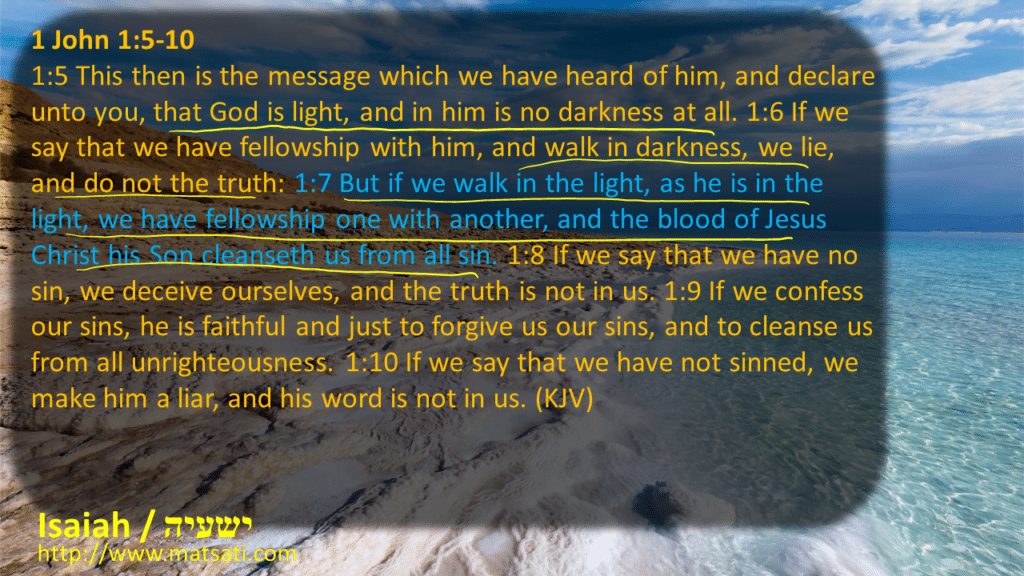
1 John 1:5-10
1:5 This then is the message which we have heard of him, and declare unto you, that God is light, and in him is no darkness at all. 1:6 If we say that we have fellowship with him, and walk in darkness, we lie, and do not the truth: 1:7 But if we walk in the light, as he is in the light, we have fellowship one with another, and the blood of Jesus Christ his Son cleanseth us from all sin. 1:8 If we say that we have no sin, we deceive ourselves, and the truth is not in us. 1:9 If we confess our sins, he is faithful and just to forgive us our sins, and to cleanse us from all unrighteousness. 1:10 If we say that we have not sinned, we make him a liar, and his word is not in us. (KJV)
We note here how John writes saying 1:7 But if we walk in the light, as he is in the light, we have fellowship one with another, and the blood of Jesus Christ his Son cleanseth us from all sin. (KJV) Now consider if one chooses to walk in the darkness (sin) and not in the light (righteousness), what is the end result? This is a subject few discuss. We note that this is a pretty heavy topic, but it certainly must be discussed as well. We know according to the scripture that Yeshua based upon his sacrifice made atonement for us in heaven. The outcome of this is our receiving the presence of God in our lives when we ask in the name of Yeshua the Messiah. The Holy Spirit of God then influences us to seek the righteousness of God in our lives meaning that we will seek to apply God’s word to our lives and live by the truth of the scriptures. The Lord brings peace and freedom for us to pursue these things in our lives. There may be those who say they believe in Yeshua, but their lives do not change. This suggests that one mentally even emotionally agrees with what the scriptures say but there is something missing. The biblical idea of peace results from submission to an overwhelming sovereign who is King and Lord over all, Hashem, the God of Israel. These things require the Lord God to help us submit our lives. The difficulty of Israel, Judah, and Jerusalem was admitting their need for the Lord and submitting their lives to Him. These verses from Isaiah 11:13-14 speak to the Lord God fulfilling His promises. Here Isaiah prophetically speaks to a future expectation of God delivering His people from their enemies, and especially the enemy of sin which is the root cause of her destruction. The One being spoken of here is greater than Moshe or David, He is the King Messiah, who is willing to even give His own life for the ones He loves!
ספר ישעיה פרק יא
טו וְהֶחֱרִים יְהֹוָה אֵת לְשׁוֹן יָם-מִצְרַיִם וְהֵנִיף יָדוֹ עַל-הַנָּהָר בַּעְיָם רוּחוֹ וְהִכָּהוּ לְשִׁבְעָה נְחָלִים וְהִדְרִיךְ בַּנְּעָלִים: טז וְהָיְתָה מְסִלָּה לִשְׁאָר עַמּוֹ אֲשֶׁר יִשָּׁאֵר מֵאַשּׁוּר כַּאֲשֶׁר הָיְתָה לְיִשְֹרָאֵל בְּיוֹם עֲלֹתוֹ מֵאֶרֶץ מִצְרָיִם:
Isaiah 11:15 states, “And the LORD shall utterly destroy the tongue of the Egyptian sea; (וְהֶחֱרִים יְהֹוָה אֵת לְשׁוֹן יָם-מִצְרַיִם) and with his mighty wind shall he shake his hand over the river, (וְהֵנִיף יָדוֹ עַל-הַנָּהָר בַּעְיָם רוּחוֹ) and shall smite it in the seven streams, and make men go over dryshod. (וְהִכָּהוּ לְשִׁבְעָה נְחָלִים וְהִדְרִיךְ בַּנְּעָלִים)” Isaiah 11:16 “And there shall be an highway for the remnant of his people, (וְהָיְתָה מְסִלָּה לִשְׁאָר עַמּוֹ) which shall be left, from Assyria; (אֲשֶׁר יִשָּׁאֵר מֵאַשּׁוּר) like as it was to Israel in the day that he came up out of the land of Egypt. (כַּאֲשֶׁר הָיְתָה לְיִשְֹרָאֵל בְּיוֹם עֲלֹתוֹ מֵאֶרֶץ מִצְרָיִם)” Isaiah draws upon the Torah the Lord will strike the Egyptian sea. The strike will divide it into seven streams. The level of water in these streams will be very low so much so that it will be like walking over dryshod. Isaiah goes on to say this will prepare a way for the remnant to return. This illustrates the concept of the Lord providing a way. Here God will make a way where what is impossible for man is possible for God. Even though there was a widespread sin in Judah and Jerusalem, we are told there was a remnant. Those who were the remnant God kept His promises regarding the survival of Israel. Remember that God said He can make a nation out of any number of peoples, take Moshe as an example, “And the LORD said to Moses, ‘I have seen this people, and behold, it is a stiff-necked people; now therefore let me alone, that my wrath may burn hot against them and I may consume them; but of you I will make a great nation.’” (Shemot / Exodus 32:9-10 וַיֹּ֥אמֶר יְהוָ֖ה אֶל־מֹשֶׁ֑ה רָאִ֙יתִי֙ אֶת־הָעָ֣ם הַזֶּ֔ה וְהִנֵּ֥ה עַם־קְשֵׁה־עֹ֖רֶף הֽוּא׃ וְעַתָּה֙ הַנִּ֣יחָה לִּ֔י וְיִֽחַר־אַפִּ֥י בָהֶ֖ם וַאֲכַלֵּ֑ם וְאֶֽעֱשֶׂ֥ה אוֹתְךָ֖ לְג֥וֹי גָּדֽוֹל׃) So the idea of the majority of the Hebrew people being destroyed and a remnant of people surviving and yet the nation of Israel survives is not surprising or difficult to believe. The destruction of the wicked from the midst of the righteous leads to a transformation of faith from the sense that there remained a people of one mind having genuine faith.
Rabbinic Commentary on Isaiah 11:10-16
The Targum Jonathan is a rabbinic interpretation of the book of Isaiah.
תרגום יונתן בן עוזיאל אל ישעיה פרק יא:י-טז
י וִיהֵי בְעִידָנָא הַהוּא בַר בְרֵיה דְיִשַי דַעְתִיד דִיקוּם אָת לְעַמְמַיָא לֵיה מַלכְוָן יִשתַמעוּן וִיהֵי אְתַר בֵית מִשרֹוהִי בִיקָר׃ יא וִיהֵי בְעִידָנָא הַהוּא יֹוסֵיף יוי תִניָנוּת גְבוּרְתֵיה לְמִפרַק יָת שְאָרָא דְעַמֵיה דְיִשתְאַר מֵאַתוּר וּמִמִצרַיִם וּמִפַתרֹוס וּמֵהֹדוּ וּמֵעֵילָם וּמִבָבַל וּמֵחְמָת וּמִנְגָוָת יַמָא׃ יב וְיִזקֹוף אָת לְעַמְמַיָא וִיכַנֵיש מְבֻדְרֵי יִשׂרָאֵל וְגָלְוָת יְהוּדָה יְקָרֵיב מֵאַרבַע רוּחֵי אַרעָא׃ יג וְתִעדֵי קִנאְתָא מִדְבֵית אַפרַיִם וְדִמעִיקִין לִדבֵית יְהוּדָה יִשתֵיצֹון דְבֵית אַפרַיִם לָא יְקַנֹון לִדבֵית יְהוּדָה וּדבֵית יְהוּדָה לָא יְעִיקוּן בִדבֵית אַפרָיִם׃ יד וְיִתחַבְרוּן כְתַף חַד לְמִמחֵי יָת פְלִשתָאֵי דִבמַערְבָא כַחדָא יִבְזוּן יָת בְנֵי מַדנְחָא בַאְדֹום וּמֹואָב יֹושְטוּן יַדהֹון וּבנֵי עַמֹון יִשתַמעוּן לְהֹון׃ טו וִייַבֵיש יוי יָת לִישָן יַמָא דְמִצרָאֵי וִירִים מַחַת גְבוּרְתֵיה עַל פְרָת בְמֵימַר נְבִיֹוהִי וְיִמחֵינֵיה לְשִבעָה נַחלִין וִיהָכוּן בֵיה בְסַנדְלִין׃ טז וּתהֵי אֹורַח כְבִישָא לִשאָרָא דְעַמֵיה דְיִשתְאַר מֵאַתוּרָאָה כְמָא דַהְוָת לְיִשׂרָאֵל בְיֹום מִיסַקהֹון מֵאַרעָא דְמִצרָיִם׃
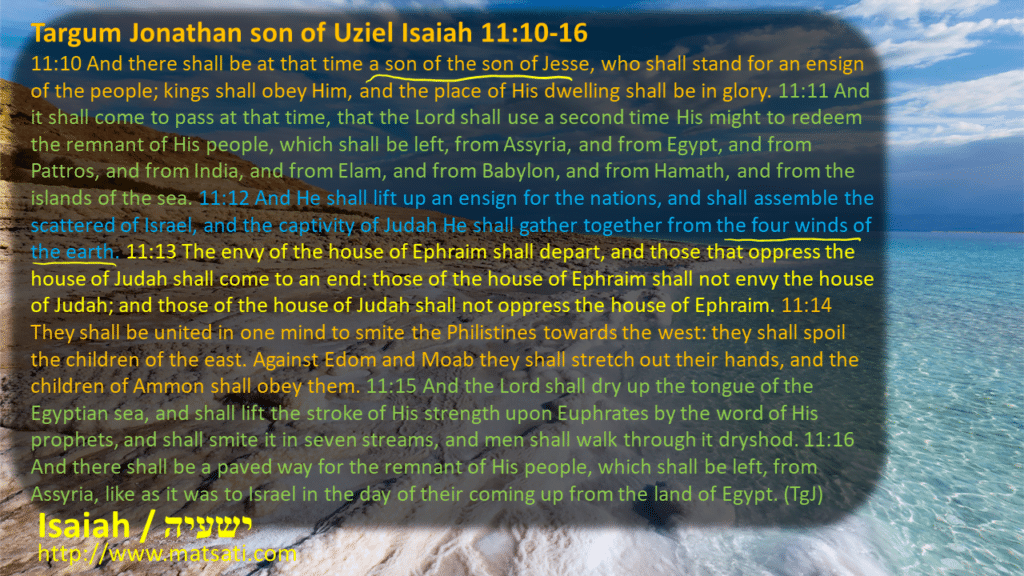
Targum Jonathan son of Uziel Isaiah 11:10-16
11:10 And there shall be at that time a son of the son of Jesse, who shall stand for an ensign of the people; kings shall obey Him, and the place of His dwelling shall be in glory. 11:11 And it shall come to pass at that time, that the Lord shall use a second time His might to redeem the remnant of His people, which shall be left, from Assyria, and from Egypt, and from Pattros, and from India, and from Elam, and from Babylon, and from Hamath, and from the islands of the sea. 11:12 And He shall lift up an ensign for the nations, and shall assemble the scattered of Israel, and the captivity of Judah He shall gather together from the four winds of the earth. 11:13 The envy of the house of Ephraim shall depart, and those that oppress the house of Judah shall come to an end: those of the house of Ephraim shall not envy the house of Judah; and those of the house of Judah shall not oppress the house of Ephraim. 11:14 They shall be united in one mind to smite the Philistines towards the west: they shall spoil the children of the east. Against Edom and Moab they shall stretch out their hands, and the children of Ammon shall obey them. 11:15 And the Lord shall dry up the tongue of the Egyptian sea, and shall lift the stroke of His strength upon Euphrates by the word of His prophets, and shall smite it in seven streams, and men shall walk through it dryshod. 11:16 And there shall be a paved way for the remnant of His people, which shall be left, from Assyria, like as it was to Israel in the day of their coming up from the land of Egypt. (TgJ)
Here the Targum translates the essence of what Isaiah was trying to say concerning the redeemer of Israel. The power of God will come through the Messiah a second time, paralleled to the Exodus from Egypt, to deliver God’s people. The Lord in His power will make a way for His people to return, like walking through the sea on dry ground when coming from the south, they will walk on dry ground (through the Euphrates) when coming from the north. In the Psalms and the prophets God is described as Israel’s Redeemer who will stand up for his people and vindicate them. Isaiah describes God as Israel’s redeemer according to Isaiah 43:1-3.
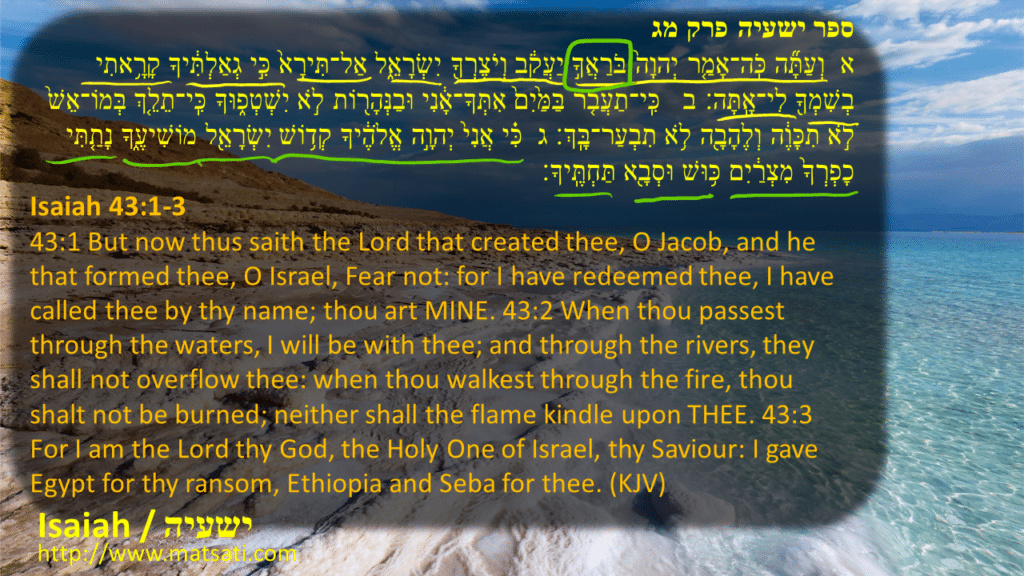
ספר ישעיה פרק מג
א וְעַתָּ֞ה כֹּֽה־אָמַ֤ר יְהוָה֙ בֹּרַאֲךָ֣ יַעֲקֹ֔ב וְיֹצֶרְךָ֖ יִשְׂרָאֵ֑ל אַל־תִּירָא֙ כִּ֣י גְאַלְתִּ֔יךָ קָרָ֥אתִי בְשִׁמְךָ֖ לִי־אָֽתָּה׃ ב כִּֽי־תַעֲבֹ֤ר בַּמַּ֙יִם֙ אִתְּךָ־אָ֔נִי וּבַנְּהָר֖וֹת לֹ֣א יִשְׁטְפ֑וּךָ כִּֽי־תֵלֵ֤ךְ בְּמוֹ־אֵשׁ֙ לֹ֣א תִכָּוֶ֔ה וְלֶהָבָ֖ה לֹ֥א תִבְעַר־בָּֽךְ׃ ג כִּ֗י אֲנִי֙ יְהוָ֣ה אֱלֹהֶ֔יךָ קְד֥וֹשׁ יִשְׂרָאֵ֖ל מוֹשִׁיעֶ֑ךָ נָתַ֤תִּי כָפְרְךָ֙ מִצְרַ֔יִם כּ֥וּשׁ וּסְבָ֖א תַּחְתֶּֽיךָ׃
Isaiah 43:1-3
43:1 But now thus saith the Lord that created thee, O Jacob, and he that formed thee, O Israel, Fear not: for I have redeemed thee, I have called thee by thy name; thou art MINE. 43:2 When thou passest through the waters, I will be with thee; and through the rivers, they shall not overflow thee: when thou walkest through the fire, thou shalt not be burned; neither shall the flame kindle upon THEE. 43:3 For I am the Lord thy God, the Holy One of Israel, thy Saviour: I gave Egypt for thy ransom, Ethiopia and Seba for thee. (KJV)
Here Isaiah confirms the Torah account of creation, we are all created by God and specially called to be His people. The Lord is our redeemer who saves us whether we go through the fire or water, etc. and Isaiah says that Egypt, Ethiopia, and Seba were given in their place. When God redeemed Israel from Egypt, it was a rebirth experience. According to the TgJ Isaiah reminds us of God’s continued faithfulness to His people, י וִיהֵי בְעִידָנָא הַהוּא בַר בְרֵיה דְיִשַי דַעְתִיד דִיקוּם אָת לְעַמְמַיָא לֵיה מַלכְוָן יִשתַמעוּן וִיהֵי אְתַר בֵית מִשרֹוהִי בִיקָר׃ 11:10 And there shall be at that time a son of the son of Jesse, who shall stand for an ensign of the people; kings shall obey Him, and the place of His dwelling shall be in glory. (TgJ) Ibn Ezra writes the following concerning this verse.
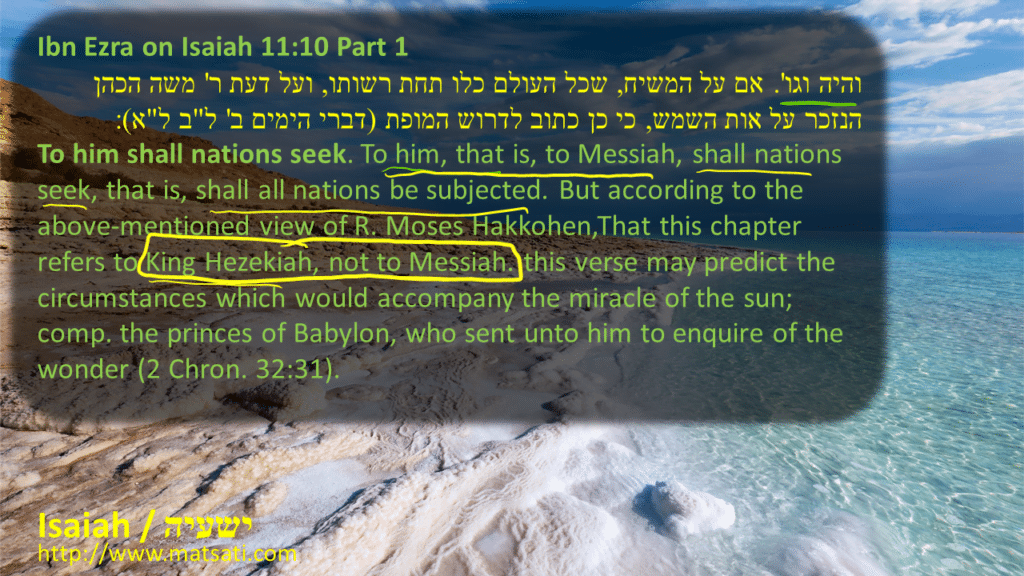
Ibn Ezra on Isaiah 11:10 Part 1
והיה וגו’. אם על המשיח, שכל העולם כלו תחת רשותו, ועל דעת ר’ משה הכהן הנזכר על אות השמש, כי כן כתוב לדרוש המופת (דברי הימים ב’ ל”ב ל”א):
To him shall nations seek. To him, that is, to Messiah, shall nations seek, that is, shall all nations be subjected. But according to the above-mentioned view of R. Moses Hakkohen,That this chapter refers to King Hezekiah, not to Messiah. this verse may predict the circumstances which would accompany the miracle of the sun; comp. the princes of Babylon, who sent unto him to enquire of the wonder (2 Chron. 32:31).
Ibn Ezra states that “to him shall nations seek” to him is a reference to the Messiah. Based upon the Scriptures, there is one almighty and all powerful God who is the creator over all (Bereshit / Genesis 1 and 2). The Tanakh (Torah, prophets, writings) describes how the Lord God has a Name, He has a mind, and establishes morality and has a purpose for all of His creation. The Scriptures describe God as being supreme over all time and space, and how He is the King of Glory and Master over all. Human history has a purpose and is guided for the purpose of the revelation of the Lord God in heaven, such that we are being led to know and understand who God is and how much He loves us. This is why history is connected to a progressive eschatology with the Messianic Expectation that is given to His people. These things guide us to understand that our ultimate destiny, no matter who we are, is to come face to face with the creator God. The particular Jewish historical narrative provided for us in the Scriptures, is that God desires a relationship with us, and looks to the future restoration and deliverance of Zion and the restoration of the perfect creation that was lost in the garden of Eden through disobedience. The Lord God is looking to restore His relationship with mankind, and create a place where there is no suffering, pain, death, or evil, where these things will be forever swept away where His people will live in a holy, sanctified, and sacred fellowship with the Lord, forever and ever! All of these things are connected to the Messiah as Isaiah describes according to Isaiah 11.
The Tanakh actually provides us with many messnianic redeemers. This is why Ibn Ezra supports the idea saying, “But according to the above-mentioned view of R. Moses Hakkohen,That this chapter refers to King Hezekiah, not to Messiah.” The reason this is true as well is due to there being many messianic figures through whom God provided deliverance to His people! So, the question is “Does the Tanakh provide evidence for many messiahs or just one?” should not be a stumbling block to one’s faith in Yeshua. The point is that we should not get hung up over this issue that God has provided salvation through a messianic redeemer such as Hezekiah. The Tanakh reveals to us these men who God has used, while also revealing that there is one Messianic King who will ultimately come in whom all the nations will seek. This is what Isaiah is directing our attention to, not just will the nations be in subjection to Him, they will also give their lives in subjection willingly to follow and walk in His ways before the Almighty God. The Scriptures direct our attention to this One whom God will bring, the Messiah as riding a donkey, lowly and humble (Zechariah 9:9) and the portrayal as one coming in great triumph “in the clouds” (Daniel 7:13) suggesting that this particular Messiah, this person will be significantly different! The many messianic figures come in the power of God, and so too this One whom God sends to save us from our sins, this One will also come in the power of God as the Scriptures say, to atone for the sins of Israel and the nations (i.e., the Suffering Servant of Isaiah 53), and second as ben David to bring judgment upon the unjust and to ‘restore the kingdom back to Israel’. This power of God in the Messiah, will be as the Targum writes according to Isaiah 11:11, יא וִיהֵי בְעִידָנָא הַהוּא יֹוסֵיף יוי תִניָנוּת גְבוּרְתֵיה לְמִפרַק יָת שְאָרָא דְעַמֵיה דְיִשתְאַר מֵאַתוּר וּמִמִצרַיִם וּמִפַתרֹוס וּמֵהֹדוּ וּמֵעֵילָם וּמִבָבַל וּמֵחְמָת וּמִנְגָוָת יַמָא׃ 11:11 And it shall come to pass at that time, that the Lord shall use a second time His might to redeem the remnant of His people, which shall be left, from Assyria, and from Egypt, and from Pattros, and from India, and from Elam, and from Babylon, and from Hamath, and from the islands of the sea. (TgJ) The power of God is present for us today to deliver us, to heal, to overcome this world, and sin just as it was available back in the day of Isaiah, and the first century time period. Both Ibn Ezra and Rashi continue saying the following:
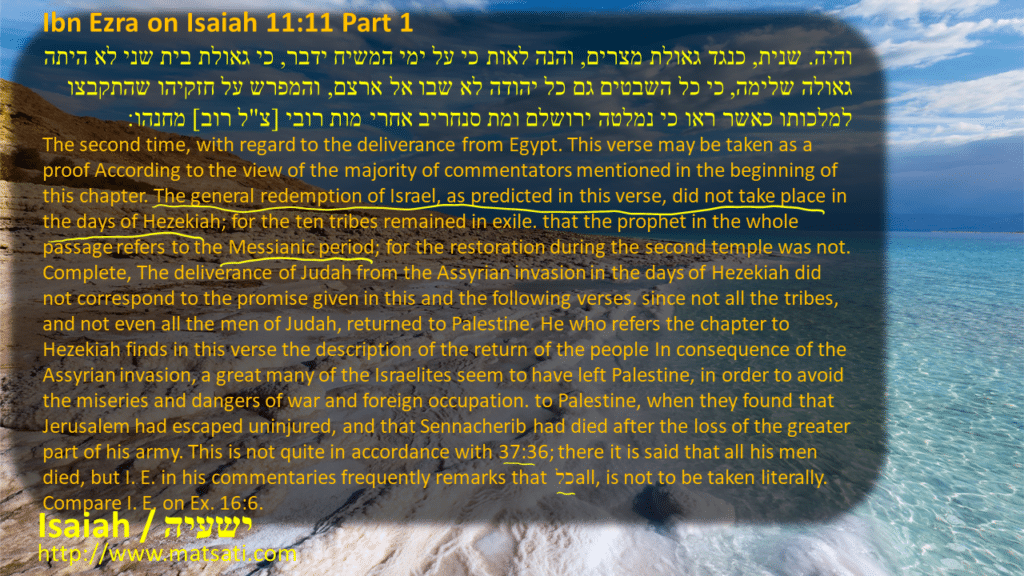
Ibn Ezra on Isaiah 11:11 Part 1
והיה. שנית, כנגד גאולת מצרים, והנה לאות כי על ימי המשיח ידבר, כי גאולת בית שני לא היתה גאולה שלימה, כי כל השבטים גם כל יהודה לא שבו אל ארצם, והמפרש על חזקיהו שהתקבצו למלכותו כאשר ראו כי נמלטה ירושלם ומת סנחריב אחרי מות רובי [צ”ל רוב] מחנהו:
The second time, with regard to the deliverance from Egypt. This verse may be taken as a proof According to the view of the majority of commentators mentioned in the beginning of this chapter. The general redemption of Israel, as predicted in this verse, did not take place in the days of Hezekiah; for the ten tribes remained in exile. that the prophet in the whole passage refers to the Messianic period; for the restoration during the second temple was not. Complete, The deliverance of Judah from the Assyrian invasion in the days of Hezekiah did not correspond to the promise given in this and the following verses. since not all the tribes, and not even all the men of Judah, returned to Palestine. He who refers the chapter to Hezekiah finds in this verse the description of the return of the people In consequence of the Assyrian invasion, a great many of the Israelites seem to have left Palestine, in order to avoid the miseries and dangers of war and foreign occupation. to Palestine, when they found that Jerusalem had escaped uninjured, and that Sennacherib had died after the loss of the greater part of his army. This is not quite in accordance with 37:36; there it is said that all his men died, but I. E. in his commentaries frequently remarks that כל all, is not to be taken literally. Compare I. E. on Ex. 16:6.
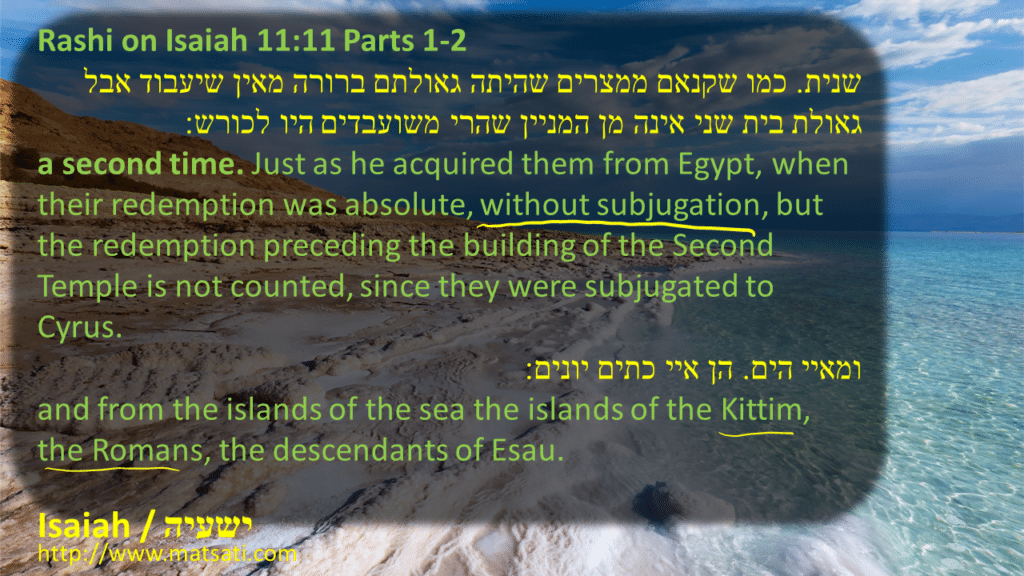
Rashi on Isaiah 11:11 Parts 1-2
שנית. כמו שקנאם ממצרים שהיתה גאולתם ברורה מאין שיעבוד אבל גאולת בית שני אינה מן המניין שהרי משועבדים היו לכורש: a second time Just as he acquired them from Egypt, when their redemption was absolute, without subjugation, but the redemption preceding the building of the Second Temple is not counted, since they were subjugated to Cyrus.
ומאיי הים. הן איי כתים יונים: and from the islands of the sea the islands of the Kittim, the Romans, the descendants of Esau.
Ibn Ezra goes on to describe how the messianic redemption given in Isaiah did not occur in the days of Hezekiah saying, “The deliverance of Judah from the Assyrian invasion in the days of Hezekiah did not correspond to the promise given in this and the following verses.” Deliverance is only temporary when it comes by the hand of these like Hezekiah. Rashi details how the redemption should come without subjugation and then lists how the people remained under Cyrus and the Romans, etc. In the Messianic redemption of Yeshua, we are redeemed and set free from the subjugation to sin. Note that it is sin that leads to bondage, as Isaiah is describing according to His book, sin brought the nations to Israel for her destruction. The main idea was that the land lost its holiness, and so the nations mistook the land as something they could have due to the unholiness of the men, women, and children who lived in that time. The point is that these temporary messianic figures brought a temporal redemption, whereas Yeshua brings an eternal one. This is whyPaul wrote what he did saying, “And so all Israel shall be saved: as it is written, There shall come out of Zion the Deliverer who shall turn away ungodliness from Jacob.” (Isaiah 59:20, Romans 11:26)
The Targum continues saying according to Isaiah 11:12, יב וְיִזקֹוף אָת לְעַמְמַיָא וִיכַנֵיש מְבֻדְרֵי יִשׂרָאֵל וְגָלְוָת יְהוּדָה יְקָרֵיב מֵאַרבַע רוּחֵי אַרעָא׃ 11:12 And He shall lift up an ensign for the nations, and shall assemble the scattered of Israel, and the captivity of Judah He shall gather together from the four winds of the earth. (TgJ) Note the connection here to John 3 and Jewish thought according to Akeidat Yitzchak 72:1 Part 7 and Rashi.
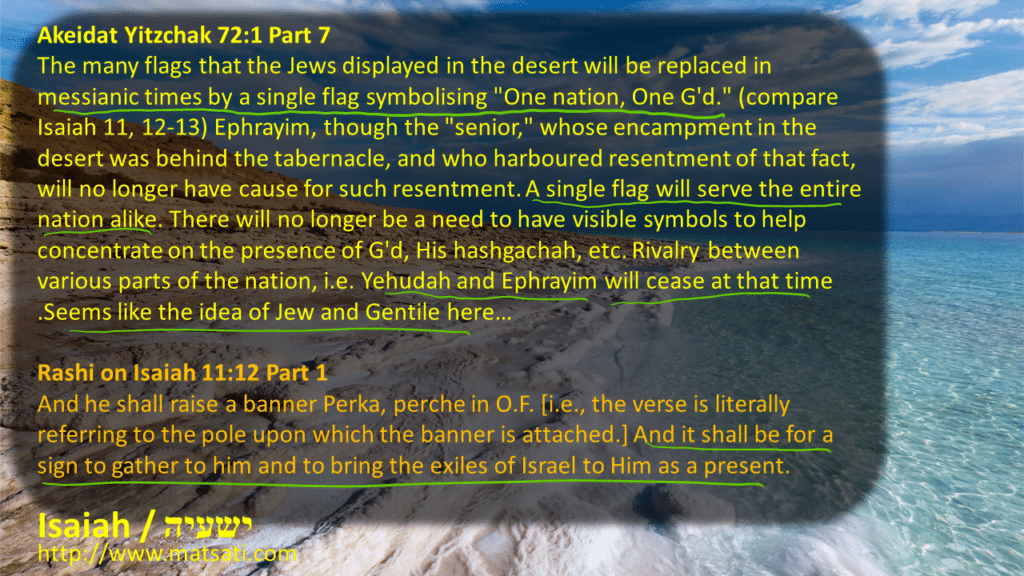
Akeidat Yitzchak 72:1 Part 7
The many flags that the Jews displayed in the desert will be replaced in messianic times by a single flag symbolising “One nation, One G’d.” (compare Isaiah 11, 12-13) Ephrayim, though the “senior,” whose encampment in the desert was behind the tabernacle, and who harboured resentment of that fact, will no longer have cause for such resentment. A single flag will serve the entire nation alike. There will no longer be a need to have visible symbols to help concentrate on the presence of G’d, His hashgachah, etc. Rivalry between various parts of the nation, i.e. Yehudah and Ephrayim will cease at that time .Seems like the idea of Jew and Gentile here…
Rashi on Isaiah 11:12 Part 1
And he shall raise a banner Perka, perche in O.F. [i.e., the verse is literally referring to the pole upon which the banner is attached.] And it shall be for a sign to gather to him and to bring the exiles of Israel to Him as a present.
According to Akeidat Yitzhak there will be a time when one standard will replace all of the tribal standards. This is connected to the Messianic King promised of God. He says “A single flag will serve the entire nation alike. There will no longer be a need to have visible symbols to help concentrate on the presence of G’d, His hashgachah.” Hashgachah is the Hebrew word for God’s providential attention to the world. The interpretation is that in God’s providence the Messiah will cause the enmity between Ephraim and Judah to end, and that this is paralleled to the Messiah resolving the enmity between Jew and Gentile. The standard being lifted up draws a parallel to what we read about Yeshua according to John 3:14 and 12:32.
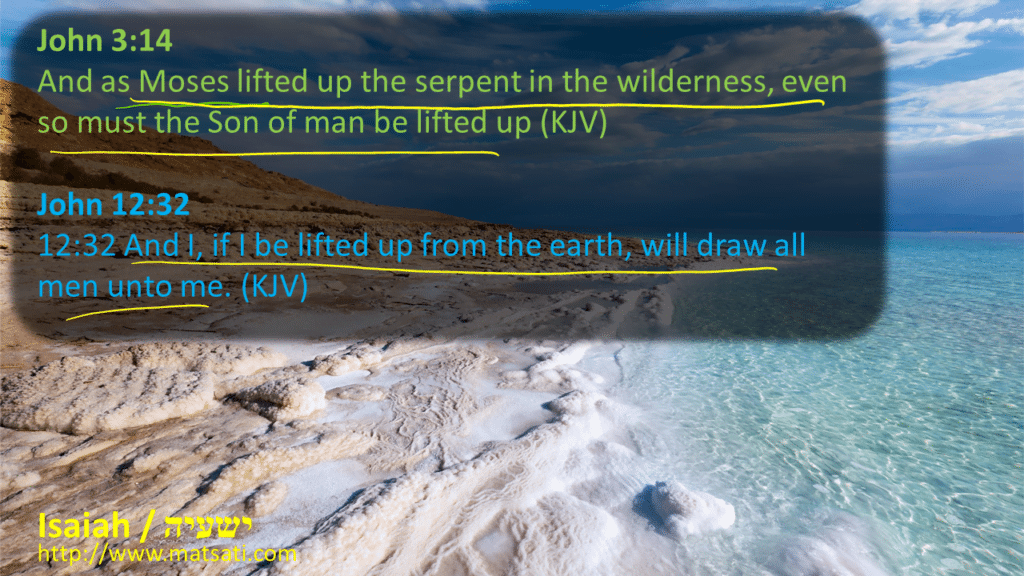
John 3:14
And as Moses lifted up the serpent in the wilderness, even so must the Son of man be lifted up (KJV)
John 12:32
12:32 And I, if I be lifted up from the earth, will draw all men unto me. (KJV)
We note that drawing all men is synonymous to the Messiah resolving the enmity between Jew and Gentile. Rashi says the standard will be for a sign to gather to him, the Messiah. These are powerful connections to the Isaiah text where we prophetically learn that God will send His Messiah to deliver His people. This is how the Targum translates Isaiah 11:13, יג וְתִעדֵי קִנאְתָא מִדְבֵית אַפרַיִם וְדִמעִיקִין לִדבֵית יְהוּדָה יִשתֵיצֹון דְבֵית אַפרַיִם לָא יְקַנֹון לִדבֵית יְהוּדָה וּדבֵית יְהוּדָה לָא יְעִיקוּן בִדבֵית אַפרָיִם׃ 11:13 The envy of the house of Ephraim shall depart, and those that oppress the house of Judah shall come to an end: those of the house of Ephraim shall not envy the house of Judah; and those of the house of Judah shall not oppress the house of Ephraim. (TgJ) The messiah will not just remove the enmity, but also put an end to the pride, hatred, and oppression that causes the enmity. Ibn Ezra and Rashi state the following concerning this verse.
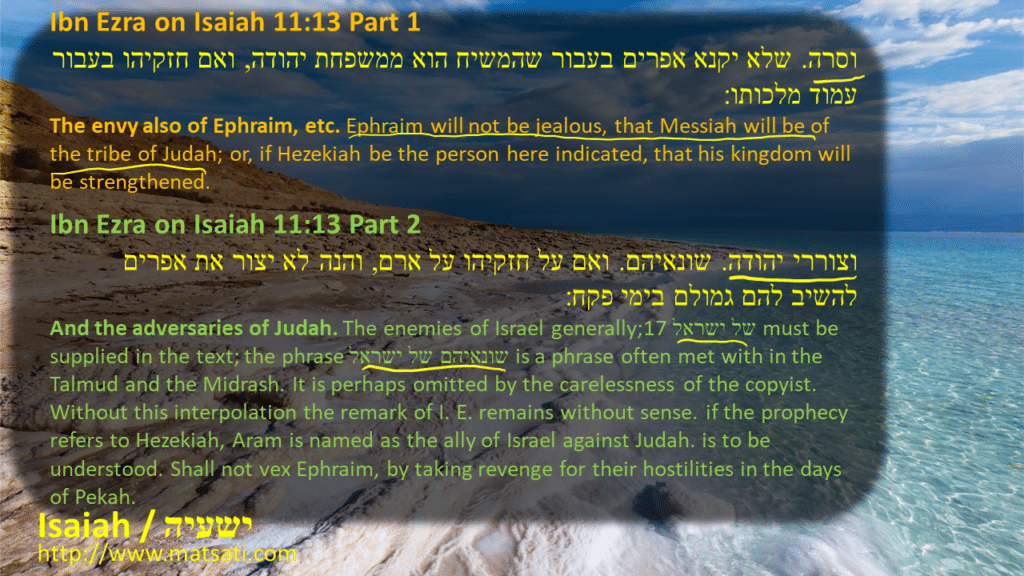
Ibn Ezra on Isaiah 11:13 Part 1
וסרה. שלא יקנא אפרים בעבור שהמשיח הוא ממשפחת יהודה, ואם חזקיהו בעבור עמוד מלכותו:
The envy also of Ephraim, etc. Ephraim will not be jealous, that Messiah will be of the tribe of Judah; or, if Hezekiah be the person here indicated, that his kingdom will be strengthened.
Ibn Ezra on Isaiah 11:13 Part 2
וצוררי יהודה. שונאיהם. ואם על חזקיהו על ארם, והנה לא יצור את אפרים להשיב להם גמולם בימי פקח:
And the adversaries of Judah. The enemies of Israel generally;17של ישראל must be supplied in the text; the phrase שונאיהם של ישראל is a phrase often met with in the Talmud and the Midrash. It is perhaps omitted by the carelessness of the copyist. Without this interpolation the remark of I. E. remains without sense. if the prophecy refers to Hezekiah, Aram is named as the ally of Israel against Judah. is to be understood. Shall not vex Ephraim, by taking revenge for their hostilities in the days of Pekah.
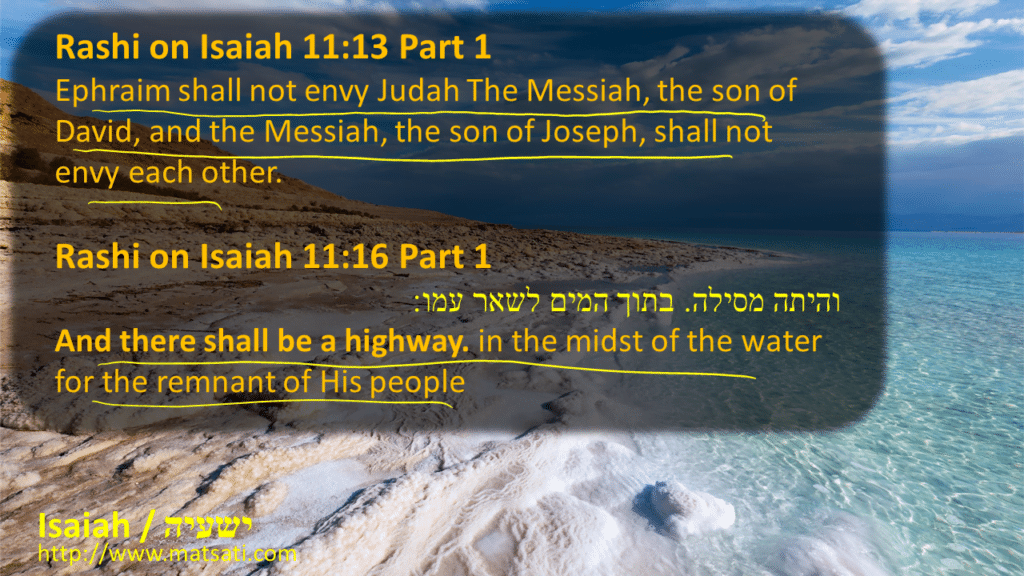
Rashi on Isaiah 11:13 Part 1
Ephraim shall not envy Judah The Messiah, the son of David, and the Messiah, the son of Joseph, shall not envy each other.
Ibn Ezra states that the Messiah will come from the tribe of Judah and Rashi says that Ephraim will not be jealous because the Messiah will be the son of David. We remember the narrative in 1 and 2 Samuel regarding God making Saul king over Israel, and then taking that from him and giving it to David. Saul represented northern Israel, whereas David represented Judah, Jerusalem, and the southern tribes. Because of this there was a split in the kingdom, but the Lord eventually healed the split as Saul died in war. There was peace between the kingdoms (north and south) and this continued on through Solomon’s reign. Solomon however sinned before God, and the result, his son Rehoboam during his reign, due to the manner in which he ruled, the split between northern Israel and Judah formed again. This division whose root was sin, leads us to the concept of the Messiah needing to deal with sin in order to resolve the root of the problem. Today, we consider that our culture, even on a world scale, is quite different from the time of King David, and even from the First Century. Every person today makes choices based on their own vision and expectation of the future, where they want to go in life. Sadly, many people live for the immediate gratification, the thrill, fast food, and mindless entertainment. This is synonymous to what Paul wrote “Let’s eat and drink, for tomorrow we die.” (1 Corinthians 15:23) Other people live their lives by enjoying fine art, learning new things, etc for the purpose of self-improvement. Apart from these things, there remains a lack of satisfaction in our hearts. These things are fleeting, transitory, or temporary, they do not last, and we were created for much more. These things don’t satisfy, and these things the people of Israel, Judah, and Jerusalem were also involved in doing. Even those who live in order to love others, friends, family, etc, when done apart from the Lord God being involved leaves a void. As God brought the messianic redeemers into the history of Israel, God brought deliverance and peace, but this also did not resolve the problems of sin. Sin is what brings the judgment of God, as Isaiah is describing, when left unchecked for too long, the nations will come to take everything. It is because of these things God brought His Messiah to deliver His people from the bondage to sin! This is paralleled to a miracle which contradicts the physical laws (gravity, physics, etc) where the Lord will literally dry up the land so the people can walk freely. טו וִייַבֵיש יוי יָת לִישָן יַמָא דְמִצרָאֵי וִירִים מַחַת גְבוּרְתֵיה עַל פְרָת בְמֵימַר נְבִיֹוהִי וְיִמחֵינֵיה לְשִבעָה נַחלִין וִיהָכוּן בֵיה בְסַנדְלִין׃ 11:15 And the Lord shall dry up the tongue of the Egyptian sea and shall lift the stroke of His strength upon Euphrates by the word of His prophets, and shall smite it in seven streams, and men shall walk through it dryshod. טז וּתהֵי אֹורַח כְבִישָא לִשאָרָא דְעַמֵיה דְיִשתְאַר מֵאַתוּרָאָה כְמָא דַהְוָת לְיִשׂרָאֵל בְיֹום מִיסַקהֹון מֵאַרעָא דְמִצרָיִם׃ 11:16 And there shall be a paved way for the remnant of His people, which shall be left, from Assyria, like as it was to Israel in the day of their coming up from the land of Egypt. (TgJ) Rashi points to this specifically.
Rashi on Isaiah 11:16 Part 1
והיתה מסילה. בתוך המים לשאר עמו:
And there shall be a highway in the midst of the water for the remnant of His people
The flowing waters, the flood, the sea, all of these things remind us of the turbulence of life especially in the desires of the flesh and sin. This is why Jewish thought centers on the vision of Zion as the restoration of the lost paradise of Eden when there was no sin. This is what the book of revelation calls the heavenly Jerusalem descending to earth, to the new creation, one without the curse of sin and death. These things will be forever swept away, and it is by the power of God through the Messiah Yeshua that these things are accomplished!
